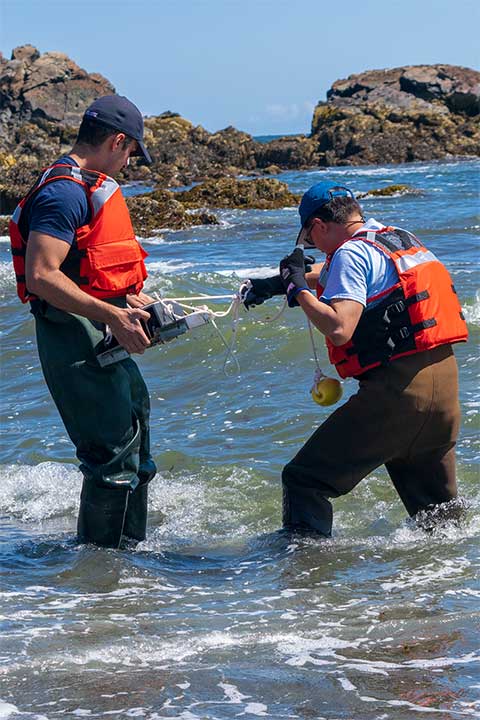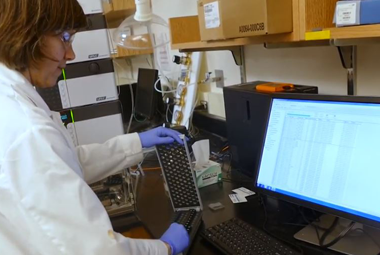
Master of Science in Environmental Engineering
Master of Science in Environmental Engineering
Overview
The Master of Science, MS, Environmental Engineering at Northeastern University program integrates the study of physical, chemical, and biological processes and fundamental principles for water and wastewater treatment and disposal, hazardous waste management, surface water and groundwater quality, water resources management, and air quality management.
Successful environmental engineering master’s graduates will have the ability to develop and implement technologies for various environmental applications with the goal to improve and protect the environment and human health. It includes required core courses from the Department of Civil and Environmental Engineering, complemented by electives in civil and environmental engineering, mechanical and industrial engineering, earth and environmental sciences, and mathematics.
Innovative Curriculum - MS in Environmental Engineering
Students learn environmental engineering principles and applications, providing core skills necessary to practice environmental engineering as a professional, to explore research methods and new discoveries, and to build knowledge in the field of environmental engineering and environmental health that may be used for a variety of careers at academic, industrial, and government careers providing sustainable solutions to ensure a safe environment for public health protection.
Unsure if you should choose the MS in Civil Engineering with a concentration in Water, Environmental, and Coastal Systems or an MS in Environmental Engineering? Connect with us to discuss which degree program is the right option for you.
- Ability to identify, formulate, and solve complex engineering problems.
- Ability to explain and apply engineering principles.
- Ability to apply techniques for water, soil, or air quality assessment with respect to environmental pollution and their underlying physical, chemical, or biological processes.
Over 15 graduate certificates are available to provide students the opportunity to develop a specialization in an area of their choice. Certificates can be taken in addition to or in combination with a master’s degree, or provide a pathway to a master’s degree in Northeastern’s College of Engineering. Master’s programs can also be combined with a Gordon Engineering Leadership certificate. Students should consult with their faculty advisor regarding these options.
Gordon Institute of Engineering Leadership
Students may complete a Master of Science in Environmental Engineering in addition to earning a Graduate Certificate in Engineering Leadership. Students must apply and be admitted to the Gordon Engineering Leadership Program in order to pursue this option. The program requires fulfillment of the 16 semester-hour curriculum required to earn the Graduate Certificate in Engineering Leadership, which includes an industry-based challenge project with multiple mentors. The integrated 36-semester-hour degree and certificate will require 20 hours of advisor-approved environmental engineering technical courses.
Experiential Learning
Northeastern combines rigorous academics with experiential learning and research to prepare students for real-world engineering challenges. Northeastern is an R1 research institution, rated among universities with the highest research activity.
The Cooperative Education Program, also known as a “co-op,” is one of the largest and most innovative in the world, and Northeastern is one of only a few that offers a co-op program for graduate students. Through this program, students gain up to eight months of professional experience employed in their field of interest as part of the academic curriculum, giving them a competitive edge upon graduation. The College of Engineering has over 3,000 co-op employer partners globally. Our dedicated team of co-op coordinators prepare students for the co-op experience through resume building, developing interview skills, and guiding professional development.
Research opportunities may be available within and outside the department and college, with involvement and access to both civil and environmental engineering and interdisciplinary research centers, facilities and state-of-the-art research laboratories such as George J. Kostas Research Institute for Homeland Security, Northeastern University Innovation Campus in Burlington, Center for High-rate Nanofacturing, The Barnett Institute of Chemical, and Biological Analysis, Environmental Chemistry, Analytical and Biotechnology/Genomics Laboratories, among others.
Program Goals
A student completing the Master of Science (MS) in Environmental Engineering will display a high level of engineering knowledge in a broad range of environmental engineering topics with the paradigm shifts and reforms visions in environmental monitoring, regulation and treatment technology development, with a primary focus on the study of environmental pollution and treatment, resources and energy recovery, and environmental and human health. Upon completion of the degree, students will possess the skills to assess the quality of water, soil, and air resources with respect to environmental pollution regulations; to understand the physical, chemical, and biological processes that influence pollution behavior in the environment; and to engineer treatment processes that maintain or improve environmental quality.
Graduate coursework is designed to instruct students on environmental science fundamentals and engineering design principles, to improve problem-solving skills, to utilize state-of-the-art data analysis and computational analysis, and to enhance oral and written communication skills.
Academic Advising
The Academic Advisors in the Graduate Student Services office can help answer many of your questions and assist with various concerns regarding your program and student record. Use the link below to also determine which questions can be answered by your Faculty Program Advisors and OGS Advisors.
Admissions & Aid
Ready to take the next step? Review degree requirements to see courses needed to complete this degree. Then, explore ways to fund your education. Finally, review admissions information to see our deadlines and gather the materials you need to Apply.

